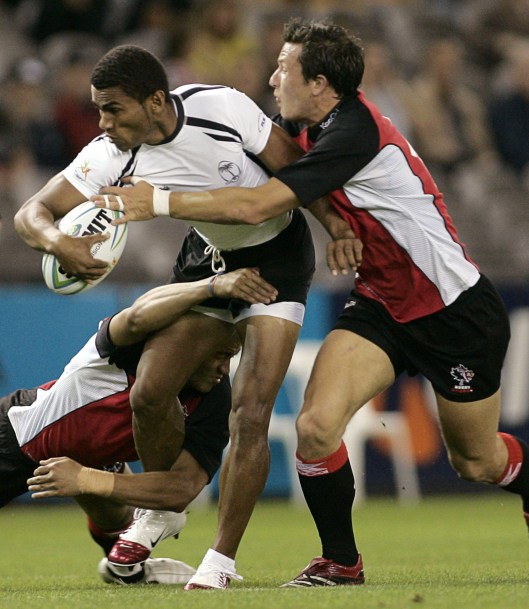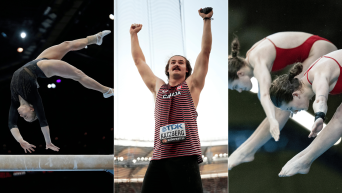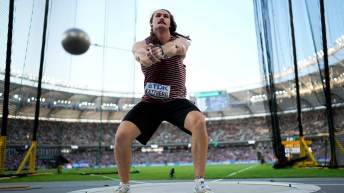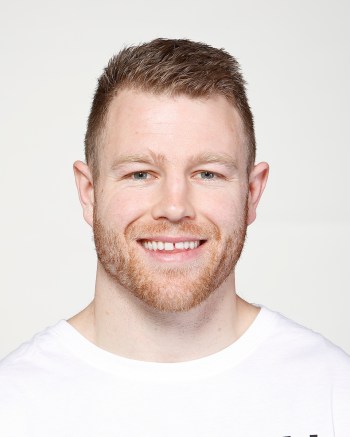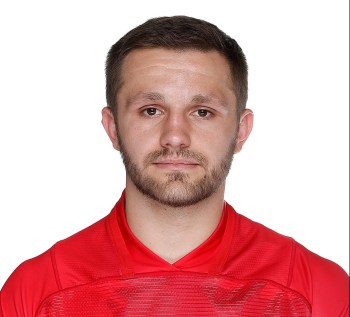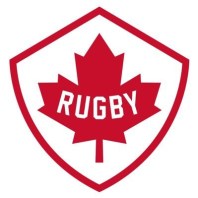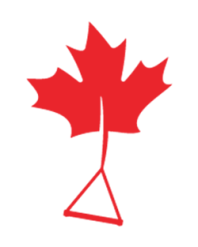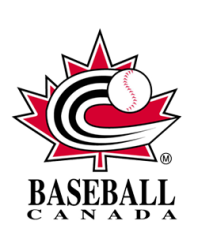Rugby Sevens Makes its Debut with Eyes Still on the Bigger Prize
Canada’s Akio Tyler (left) and Michael Danskin tackle Fiji’s William Ryder during Rugby Sevens action at the the XVIII Commonwealth Games in Melbourne, Australia in March, 2006.
With the XVI Pan American Games coming up this October, a unique group of teams will represent Canada in Guadalajara, Mexico. All summer long, we profile the nine sports in which Canada competes only at the Pan American Games.
The newest Pan American-exclusive sport won’t be keeping its status for long.
Rugby Sevens, a variation of the main game contested with fewer players, will make its debut at the Pan Am Games this October in Guadalajara, Mexico. But after official acceptance two years ago as an Olympic Sport for Rio 2016, competition this fall and beyond has taken on greater significance.
“(The Pan Am Games) are going to be a huge event for us, especially in 2015 because that will be the qualifier for the Olympics,” said Brian Hunter, Team Manager for Rugby Sevens at Rugby Canada. “It’s going to be one of the more important tournaments that we’ll participate in.”
Rugby, in general, is similar to American football and is generally credited as its origin. Players attempt to rush an oval-shaped ball down a large field into an end zone in order to score points. If successful, a conversion is then performed, where a player kicks the ball through a set up of uprights. At the same time, the defending team’s goal is to stop the offensive rush by tackling its opposition to the ground.
One of the main differences from football, players are forbidden from passing the ball forward, and instead must make lateral or back passes. During a Sevens game, effective passing becomes key, as only seven players are allowed on the field for each team – three forwards, one scrum half and three backs – unlike Union rugby, which features 15 players aside. Sevens is also a shorter match, with two seven-minute halves and a 30-second break at half-time. Hunter feels that is what makes the 14-minute sprinting game exciting, and worthy of a permanent spot at the Olympics.
“I would make a bold statement and say that once the public sees it, even the uneducated fan, they’re going to love it, because it’s very fan-friendly,” said Hunter. “You don’t really have to understand the game to enjoy the athleticism, the speed, the power and the impacts that you’re going to see.”
In preparation for their first Pan Am competition, Canada will turn to a familiar face as they assemble their roster. Captain Phil Mack has been a part of the squad for six years and, as long as he is healthy, he will lead the team into Guadalajara. But beyond Mack, the team is wide open. Many of Rugby Canada’s veterans of the Sevens game may be unavailable, as they will be competing at World Cup in New Zealand just prior to the Pan Am Games and may not return in time. The list of significant players includes Conor Trainer, Ciaran Hearn, and Nathan Hirayama, all of which Hunter would benefit from having on his team.
Regardless of who makes this year’s team, all of the athletes are forced to lead double lives. When they are not on the field, the players have jobs and school studies to attend to, as rugby is not a professional sport in Canada. And while some do receive a small monthly stipend to cover the time taken off, the situation remains a challenge.
“To find the time to take two or three weeks out of their work time or potential holiday time, to train (takes) a special kind of athlete,” said Hunter. “When you take two weeks off, can you get your buddies to change shifts for you? (Then) when you get back, and you’re working straight shifts it can be physically fatiguing on the person and they’re maybe not getting the training that they need to be doing.”
Heading into Guadalajara, Canada will look to achieve that balance to achieve success. Canada has competed in Rugby Sevens at four Commonwealth Games, beginning in 1998, reaching the quarterfinals at Melbourne 2006. But with perennial powerhouses New Zealand, Fiji, Australia, and South Africa out of the picture at this event, Canada plans to be right in the mix for the title.
“We have a realistic shot of winning it,” said Hunter. “And if we are not in the top three, that would be a huge disappointment. We fully expect to be playing in the final. That’s not to disregard the up-and-coming nations but, if you were to ask on paper who the top three would be (at the Pan Ams), in no particular order, it would be Canada, Argentina and the U.S.A.”
Don’t miss a moment of the action later this summer as Canada prepares for the upcoming World Cup and Pan American Games! Catch Canada against the United States in a Rugby Sevens exhibition match on Saturday, August 6, 2 PM at BMO Field in Toronto. For tickets go to: www.ticketmaster.ca/event/1000466C9B47478B

